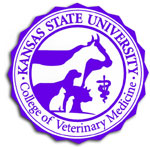Introduction

The faculty and staff of the College of Veterinary Medicine at Kansas State University prepares professional students for a wide array of careers in veterinary medicine, conducts broad-based basic and applied interdisciplinary research, and provides life-long learning opportunities for graduate veterinarians through continuing education. In the land grant tradition the college has three primary missions: teaching, research, and public service.
The preparation of professional students to meet the demands of veterinary careers during the 21st century is the primary objective of the College of Veterinary Medicine. The college is committed to assuring that each of its graduates is a professional with the academic foundation and clinical skills to enter a wide array of veterinary careers. By definition being a professional includes a commitment to life long learning and a commitment to rendering public service. It is essential that each professional student develop strong communication skills, positive interpersonal skills, a high sense of professional ethics, and the ability to efficiently solve problems. The college is committed to training students in information management, both in the acquisition of information through traditional means such as libraries and through emerging means such as the internet and the world wide web. Each student is given the opportunity to acquire business and financial planning skills.
In addition to preparing students for a wide array of veterinary careers, the college is committed to preparing exceptional students to be successful in graduate studies, internships, and residencies.
The instructional program of the college reflects the demands for veterinary services in Kansas, Nebraska, and the region. Historically, the college has produced sought-after graduates prepared for traditional veterinary practice. The college’s graduates have historically enjoyed the reputation of being very practically oriented and prepared for practice at graduation. Because of the geographical location of the college and because of deliberate program development, the college has become a national resource for graduates prepared for food animal practice. About fifty percent of the college’s graduates during the last decade have sought positions immediately following graduation with a strong food animal component. The emphasis on food animal education is important for Kansas, Nebraska, and the United States.
The college’s obligation to provide educational experiences is not limited to professional students. The dissemination of new information and technology to veterinarians, technicians, producers, and companion animal owners is also considered very important.
Conducting significant basic and applied research and training competent graduate students through interdisciplinary programs are missions of the college. The college is working to become the leader in food animal veterinary research. Other research programs of emphasis include neuroscience, cardiovascular studies, respiratory function, infectious diseases, genetic diseases, staphylococcal infections, greyhound diseases, etc. Graduate studies are offered for non-veterinarians, graduate veterinarians, and for professional students. A dual degree (DVM/MS) program is offered. Graduate students can earn master degrees in clinical sciences, anatomy and physiology, and pathology and doctoral degrees in physiology and pathology.
To fulfill the mission of providing the highest quality animal health care through directed service the college operates a comprehensive teaching hospital and a state-of-the-art diagnostic laboratory. Primary, secondary, and tertiary care are provided for local and referred patients.